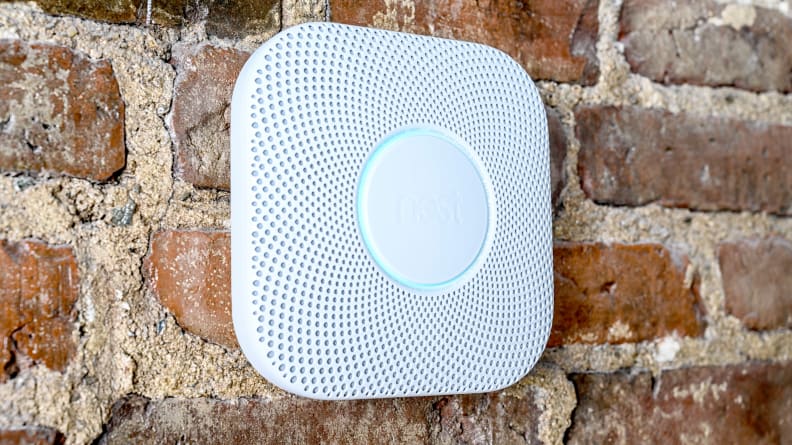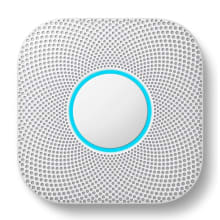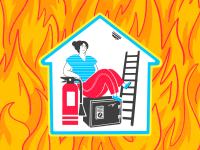With Daylight Saving Time ending, now's a good time to change your smoke alarm batteries
Changing your clocks? Change your batteries, too.
Products are chosen independently by our editors. Purchases made through our links may earn us a commission.
Daylight Saving Time (DST) ends on Sunday, November 3 at 2 a.m. wherein clocks across the country will 'fall back' to 1 a.m. The end of Daylight Saving Time tends to be more loved than the beginning, as we gain an hour of sleep. However, it certainly comes with a tradeoff as the darkness of nighttime comes earlier in the day, giving us less daylight to enjoy.
While your Wi-Fi-enabled devices will automatically adjust to the time change, you’ll need to manually change some clocks around your house (think: oven, microwave, etc.). As you’re changing clocks around the house, it gives you the perfect opportunity to adjust other items around your home, namely, the batteries in your smoke detector.
The “Change Your Clocks, Change Your Batteries” campaign created by the National Fire Protection Association (NFPA) encourages homeowners to change their smoke detector batteries whenever they're changing their clocks for DST, equating to twice a year.
Checking and changing your smoke detector batteries is easy to do—the hard part is actually remembering to do so, which is why this handy pairing with Daylight Saving Time is ideal. With DST ending, here's your friendly reminder to change those batteries, along with smoke detector tips and information to keep them properly maintained year-round.
How often should I be replacing my smoke detector batteries anyway?
Smoke detectors with non-replaceable, 10-year batteries are designed to work for up to 10 years, according to the NFPA. Once you start hearing that dreaded "chirping" noise, signaling that the battery is low, you'll need to replace the entire smoke detector promptly.
For smoke detectors that use any other type of batteries, they'll most likely need a new battery at least once a year—and for those who may need a gentle reminder to check on your smoke detector's batteries, using the beginning and end of Daylight Saving Time is a great way to remember.
When in doubt about when to change the batteries or what kind of batteries to use, the NFPA recommends following the alarm manufacturer's instructions, which may end up being brand- or even model-specific.
How to test your smoke detectors
Smoke detector maintenance is key to protecting you and your family from a potential house fire. Regularly testing your smoke detectors ensures that the batteries and the alarm itself are all working correctly.
All smoke detectors in the home should be tested at least once a month—but don't worry, it's quick and easy to test them. Simply push the "test" button on the exterior alarm and wait for it to respond.
If your detector is not responding, check the batteries to make sure they’re still good. If not, replace them as soon as possible. If this isn’t a battery issue, it may be time for a replacement.
To make sure you're fully covered, you’ll need to check up on all of the detectors in your home on a regular basis.
How to know when it's time to retire your smoke detector
No matter how well an appliance or tech gadget is working, it'll have an expiration date. The same goes for smoke detectors, which the NFPA recommends replacing after 10 years regardless of their condition.
Along with this information, you can check your alarm's expiration date, which makes it easier to know exactly when it's been 10 years. You can find this by removing the smoke detector from the wall or ceiling and looking for the date on the back.
Our favorite combination smoke and carbon monoxide detector

Our favorite smart smoke and carbon monoxide detector, the Nest Protect, is easy to install and comes with plenty of protective features.
While smoke detectors are historically known for alerting your family of a fire emergency, combination smoke and carbon monoxide detectors (CO) can do even more, keeping your family safe from dangerous CO exposure. Even more, a smart smoke and carbon monoxide detector can make protecting your family even easier with features like real-time notifications to your phone and voice alerts.
Out of all the smart smoke and carbon monoxide detectors we put to the test, the Nest Protect Smoke & Carbon Monoxide Alarm is our top choice. The fairly-priced alarm uses a split-spectrum sensor to sense both smoldering and fast-burning fires, helping to keep your family safe no matter the fire emergency. It also features intuitive features like push notifications, a night light option, and even a monthly self-test feature.

This smart dual smoke and CO detector offers real-time phone notifications for a fair price.



